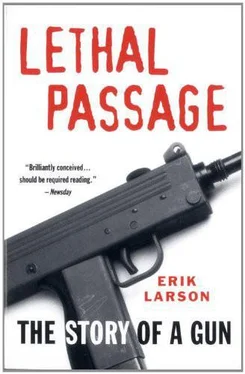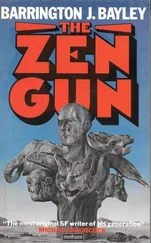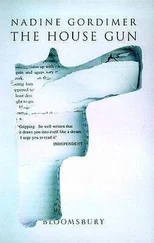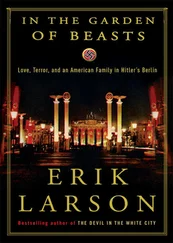I took the first step toward learning to shoot in October 1992 when I took a beginner’s course in self-defense shooting from a woman named Paxton Quigley, a near-celebrity among gun owners. Although I took the course when I was already well into my journey through the gun culture, I present it here as a kind of introduction, for it taught me worlds about why the shooting passion burns so bright. It demonstrated how guns can seem such a compelling solution to the helplessness so many Americans now feel in the face of what they perceive to be a wild surge in violent crime.
In the hands of so astute a marketer as Paxton Quigley, the concept of armed self-defense becomes nearly irresistible. She brings to the fray a carefully crafted image, that of a former antigun activist who saw the light after the rape of a close friend. In fact, she was a marginal activist at best—“a glorified gofer,” as one contemporary put it. And the rape was nowhere near as influential as Quigley’s realization that a book on armed self-defense by a former antigun activist might be a hot seller. E. P. Dutton published the book, Armed & Female , in 1989, and soon afterward Quigley began teaching women to shoot. Shooting became a vehicle for feminine empowerment. “By getting over their fear of guns and knowing they can take care of themselves,” Quigley told me, “they become more confident human beings.”
Although the message may at first seem novel, at its root it is nothing more than a repackaged and redirected version of the message broadcast repeatedly to Americans since the late nineteenth century by presidents, newspaper reporters, Hollywood producers, TV writers, novelists, poets, and painters: just as guns won the West, they will win you peace of mind on the wild and woolly urban frontier. One of Quigley’s students, Noelle Stettner, a Libertarian disc jockey from Gainesville, Georgia, synthesized this idea aptly when she told me she saw armed self-defense as “the last frontier of feminism.”
♦ ♦ ♦
“Okay,” Paxton Quigley bellowed, “on the count of three, everyone say, ‘ Get the fuck out of here !’”
Nineteen Georgia women stood in a circle inside the meeting room of the Cherokee Gun Club in Gainesville, Georgia. Inside the circle stood Quigley. As always, she had begun the course with a couple of hours of instruction on basic self-defense techniques and on helping the women to stop thinking like victims.
“I don’t want you smiling,” Quigley said. For a small woman she had a surprisingly powerful voice. She was petite, blond, and by anyone’s standard, drop-dead gorgeous. She wore a snug black blouse, a purplish tweed blazer with a peach kerchief in the pocket, and skintight jeans, with a gold chain looped a few times around her tiny waist. She moved within the circle in long concussive strides, the hard heels of her python-skin boots slamming the linoleum. “I want you to be angry, because women are basically fearful,” she told the group. “I want you to come from a strong position.”
The women screamed again, with considerably more conviction. The room erupted in laughter, war whoops, and scattered shouts of “Aw right !”
Although the message was serious, Quigley had designed the exercise to keep the mood light, part of her strategy for helping women shed their fear of guns and get them in the mood to shoot. Typically, most of the women who take Quigley’s beginner class have never shot a gun before. Here, however, all had done so except me and three of the women. Several in fact possessed concealed-weapons permits. One was an NRA pistol instructor, although she did not disclose this to her fellow students until the class had ended. When Quigley expressed her surprise at the level of expertise, one woman drawled with mock menace, “You’re in Georgia now.”
The smiles faded rapidly, however, when Quigley played a tape supplied by the NRA of a 911 emergency call placed by a Kansas City woman as a rapist made his way toward her bedroom.
The operator advised the woman to lock her bedroom door.
“He’s here,” the victim cried. “He’s in the room.”
She grew increasingly terrified until at last she screamed, “Who are you? Why are you here? Why are you here? Why?”
The line went dead, followed by the ominous flat chord of a dial tone.
The tape had a curious effect. “I was furious,” Linda Lovejoy, an Atlanta accountant, told me. “She should have been able to protect herself. The helplessness is what really got to me. She had no means of fighting back.” The tape struck Noelle Stettner, the disc jockey, the same way. “You start thinking, This stupid bitch’—to be honest.”
This is how Quigley wants her students to feel. “Obviously,” she told the suddenly subdued class, “if she’d had a gun, that would have helped the situation. She didn’t fight. At that point, you don’t ask, ‘Who are you, why are you here?’ She was a victim, a horrible victim. It’s awful to show, but you don’t want to be a victim.”
She then invited the women who’d brought their own guns to pull them from their purses, fanny packs, and locked steel gun boxes. To those who needed guns, she loaned top-quality Smith & Wesson revolvers.
Her choice of brand was no accident. Quigley received a monthly stipend from Smith & Wesson, as well as a supply of guns, in return for giving talks to gun groups, visiting gun dealerships to advise women on the guns they ought to buy, and of course helping to staff the Smith & Wesson booth at the annual SHOT Show, a huge trade show for licensed firearms dealers. She loaned me an expensive Smith & Wesson .357 revolver, black, with an elegant wood grip and red-dot sight. “Of course. What am I going to do, give you a lousy gun?” she told me later. “I want you to do well.”
After a series of loading and unloading drills, Quigley sketched the upper torso of a man. She circled the broad area between the sternum and shoulders known to combat shooters as the “center of mass,” the area where a bullet is most likely to cause enough destruction of tissue and bone and such catastrophic neural shock as to stop an assailant before he can complete his attack. This is a nice way of telling the women to shoot to kill.
“We’re also going to practice some head shots,” Quigley said. “It’s hard to shoot someone in the face because we think of the face as the person, as the soul—I hate to talk like this, but if you shoot someone in the face, you have a very good chance of stopping him.”
She led the class down to one of the Cherokee Gun Club’s outdoor ranges. Everyone wore safety glasses. Quigley carried a bullhorn so she would be heard through the earplugs and pistol earmuffs everyone wore as protection against the damaging roar of the guns. “To those of you who’ve never shot before,” Quigley said, a warm smile playing across her face, “welcome. You’ll have a wonderful time.”
Many of Quigley’s former students report that the act of firing a gun for the first time triggered a revolution in their lives. Michelle Sullivan, of South Pasadena, California, took her fifth course from Quigley in January 1993. She took her first early in 1992. “The first time I stood there with a loaded gun, I wanted to cry,” she told me. “I thought, is this what my life has come to—I’m standing here holding a loaded gun?”
Sullivan hit the target on her first shot. “It was like I walked up to a psychological barrier, crossed it, and everything was fine. It was a complete turnaround in thinking. Complete.”
Each of twenty targets was papered with the black silhouette of a man’s upper body. Clear plastic bags draped the silhouettes to protect them from the rain. Half the class stood along the firing line seven feet away.
Читать дальше








![Ричард Деминг - Whistle Past the Graveyard [= Give the Girl a Gun]](/books/412176/richard-deming-whistle-past-the-graveyard-give-t-thumb.webp)



